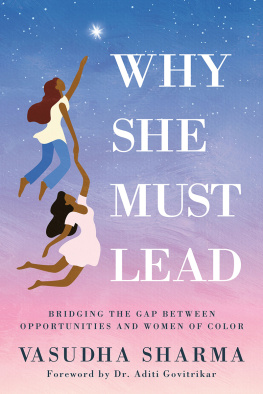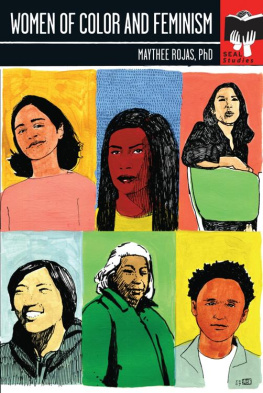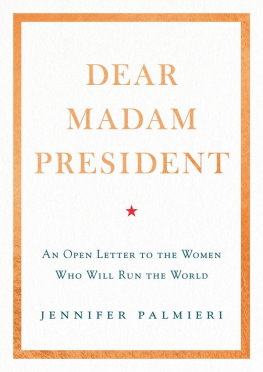Copyright 2020 by Cecilia Muoz
Cover design by Ann Kirchner
Cover image by Razym / Shutterstock.com
Cover copyright 2020 Hachette Book Group, Inc.
Hachette Book Group supports the right to free expression and the value of copyright. The purpose of copyright is to encourage writers and artists to produce the creative works that enrich our culture. The scanning, uploading, and distribution of this book without permission is a theft of the authors intellectual property. If you would like permission to use material from the book (other than for review purposes), please contact permissions@hbgusa.com.
Thank you for your support of the authors rights.
Seal Press
Hachette Book Group
1290 Avenue of the Americas, New York, NY 10104
sealpress.com @sealpress
First Edition: April 2020
Published by Seal Press, an imprint of Perseus Books, LLC, a subsidiary of Hachette Book Group, Inc. The Seal Press name and logo is a trademark of the Hachette Book Group.
Some names and identifying details have been changed to protect the privacy of individuals.
The Hachette Speakers Bureau provides a wide range of authors for speaking events. To find out more, go to www.hachettespeakersbureau.com or call (866) 376-6591.
The publisher is not responsible for websites (or their content) that are not owned by the publisher.
Library of Congress Cataloging-in-Publication Data
Names: Muoz, Cecilia, author.
Title: More than ready : be strong and be you and other lessons for women of color on the rise / Cecilia Muoz.
Description: First edition. | New York : Seal Press, 2020.
Identifiers: LCCN 2019048874 | ISBN 9781580059480 (hardcover) | ISBN 9781580059497 (ebook)
Subjects: LCSH: Minority womenPsychology. | Minority women in the professions. | Success.
Classification: LCC HQ1161 .M86 2020 | DDC 305.48/8--dc23
LC record available at https://lccn.loc.gov/2019048874
ISBNs: 978-1-58005-948-0 (hardcover); 978-1-58005-949-7 (ebook)
E3-20200305-JV-NF-ORI
Gracias, Katty and Eduardo,
for making it all possible.
Thank you, Amit,
for bringing me joy every day.
Tina and Meera,
this is for you, with love.
I OWE A GREAT DEAL TO THE SEVEN WOMEN WHO GENEROUSLY shared their stories and insights with me as I was preparing this book. I conducted the interviews in person or by phone, and with their permission, I took detailed notes and used a taping service to record our conversations. This made it possible for me to include extensive excerpts and share the womens words with you as I heard them.
While writing this book, I gave a lot of thought to the choice of words that I used to describe the community that I am a part of. Some prefer to call ourselves Hispanic, which refers to our ancestry in the Spanish-speaking world. Others prefer Latino, which refers to our geographic origins in Latin America. Neither fully captures who we are, so for decades I have used both terms interchangeably, which is what I ultimately chose to do in this book.
This decision does not come without complications. Using Latino is problematic in particular because Spanish is a gendered language; for years, I have used Latino when I am referring to a man, Latina, when I mean a woman, and Latino/a when it could be one or the other. For the purposes of this book, I have traded the awkward Latino/a for the recently invented Latinx, which describes the community in a gender-neutral way.
I am aware that this is a controversial choice. People who use Latinx make the case that we should adapt our language to be as inclusive as we can, making room for men, women, and people who dont conform to traditional ideas of gender. They point out that language has the power both to reflect the ways in which the world is changing and to pave the way for that change. Others argue that Latinx is a word invented outside of our community in an unwelcome attempt to change a language that many of us have fought to preserve. They rightly point out that Latinx is a term that most of the community wouldnt recognize and may not accept.
I am respectful of and sympathetic to both arguments, and I wrestled with the decision. I believe in the power of language enough to have spent a lifetime insisting that we use it in a way that opens doorsand mindsto women. In the end, I concluded that the people in my family and community who dont conform to either gender deserve the same. I found using a new and unfamiliar word uncomfortable at first, and you might, too. Well adjust. Thats the point.

SONIA SOTOMAYOR. ILEANA ROS-LEHTINEN. MAE CAROL Jemison. Carole Moseley Braun. Condoleezza Rice. Deb Haaland. Sharice Davids. Pramila Jayapal. Geisha Williams. Urusla Burns.
These women of color share something remarkable. They are all firsts: the first Latina Supreme Court justice (Sotomayor) and congresswoman (Ros-Lehtinen); the first African American female astronaut (Jemison), senator (Moseley Braun), and secretary of state (Rice); the first Native American and South Asian American women elected to Congress (Haaland, Davids, Jayapal); and the first Latina (Williams) and Black (Burns) women to lead Fortune 500 companies. The other thing they all have in common is that they served or are serving in our lifetimes. We watch them as they make their way and write their own histories. Each of them is doing it without a script, with no guide to lead the way and little in the way of precedents.
I have witnessed many such firsts. I knew the late Congresswoman Patsy Mink, a Japanese American from Hawaii who was the first woman of color ever elected to the United States Congress, and I remember when the late Shirley Chisholm, the first African American congresswoman, ran for president. I am one of few Latinas who have ever served as an assistant to the president of the United States, and the first to lead the White House Domestic Policy Council, where I served in the West Wing under President Obama. My predecessor, the wonderful Melody Barnes, was the first African American woman in the same role. As women of color, we are among a generation accomplishing firstswhether the first in our families to attend college, enter a traditional workplace, or embark on a nontraditional path. We have forged new roads, often without role models of our own, because we had no other choice. There was nobody that looked like us or who grew up like us taking on these roles before we did. Our stories have largely not been written because they are still unfolding.
Just as we are often firsts, its not unusual for us also to be onlies: the only woman in the room; the only person of color; and the only one bringing our particular set of experiences and expertise to our workplaces, classrooms, and teamsthe various circles in which we conduct our lives. Sometimes being a first or an only means that we doubt ourselves. We wonder whether we really belong in these spaces and whether what we bring to them is enough. The moment we open our mouths, we may feel that we are not only speaking for ourselves but may be understood to be speaking for everyone like us. Thats a lot of weight to carry. It can feel like a lot of responsibility.












